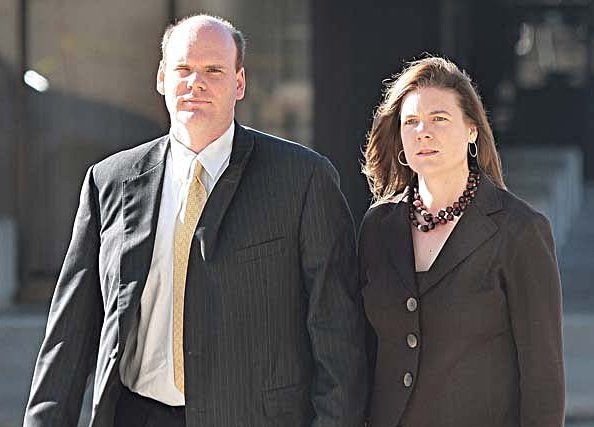LITTLE ROCK — A jury of 12 women has begun deliberations in the trial against Aaron Jones, the prominent Saline County developer and attorney accused of burning down his Chenal Valley mansion in a scheme to collect the insurance money.
The jury received instructions and was dismissed from U.S. District Judge Brian Miller's courtroom just after 12:40 p.m., more than two hours after closing arguments began Tuesday morning.
Jones has maintained his innocence, telling investigators the May 30, 2008 fire was the work of armed intruders who bound him with duct tape, doused the home in diesel fuel and then lit it.
Prosecutors throughout the trial portrayed Jones as a man facing financial difficulties, unable to make his house payment or find a buyer for the $1.6 million home. Jones' defense attorneys scoffed at that depiction, pointing to a net worth of more than $4 million and other assets they said were worth hundreds of thousands more.
The two sides reiterated their stances during closing arguments, painting starkly different pictures of what happened leading up to, during and after the fire.
Assistant U.S. Attorney Julie Peters repeatedly called Jones' story "absolutely false" while casting doubt on whether armed intruders would take a crowbar from the garage, use it to bust inside and then place it back where they found it before tying Jones up, splashing diesel fuel around the house and lighting it.
"These are not only the neatest intruders in the world, they are the most efficient intruders in the world," Peters said. "Because Aaron Jones says they did all that in 15 minutes."
Peters also pointed to Jones' DNA found on duct tape in a trash compactor in the house and questioned why the intruders would have bound his hands in front of him, allowing him to take a piece of tape off his eyes and escape. She showed the jury photographs showing where the fire started in each room and said Jones "must have walked straight through fire" if his story about getting out of the home is to be believed.
And Peters reminded jurors of the testimony of a forensic accountant, who said Jones' finances had serious liquidity problems.
"In May 2008, Aaron Jones was a man who needed cash to keep up with his lifestyle," Peters said. "He did not have the cash. He saw the writing on the wall. And so he burned his house down."
Defense attorney Tim Dudley blasted the forensic accountant's testimony, saying he examined only bank records and no other finanical documents and that his words contradicted other witnesses who said Jones had money and thus no motive for setting the fire.
Dudley mentioned the prosecutors by name while criticizing the handling of the case as a whole, saying the investigation was botched, the focus was narrowly placed on Jones and the prosecution was colored by misleading or incorrect information.
"We have a right to expect more from our government than to get in court and cheat," he said. "And that's exactly what happened in this case."
Dudley said a possible lead about a car speeding off just before the fire was largely ignored, items that could have proved Jones was innocent - such as the duct tape he was bound with - were discarded without DNA testing and that other evidence supported Jones' innocence.
Among the items Dudley pointed to was a pair of soiled underwear Jones was wearing the night of the fire.
"If Aaron Jones set that fire himself, why would he pee his pants," Dudley said, wearing a plastic glove and holding the underwear up for the jury. "You pee your pants because you're scared to death" and Jones wouldn't be if he had set it himself.
Prosecutors responded in rebuttal that Jones might have been scared when he realized his story wouldn't hold up and that authorities would realize he was responsible for the blaze.
Jones is facing three counts of mail fraud and one count of using fire to commit mail fraud after submitting materials for the insurance claim.

